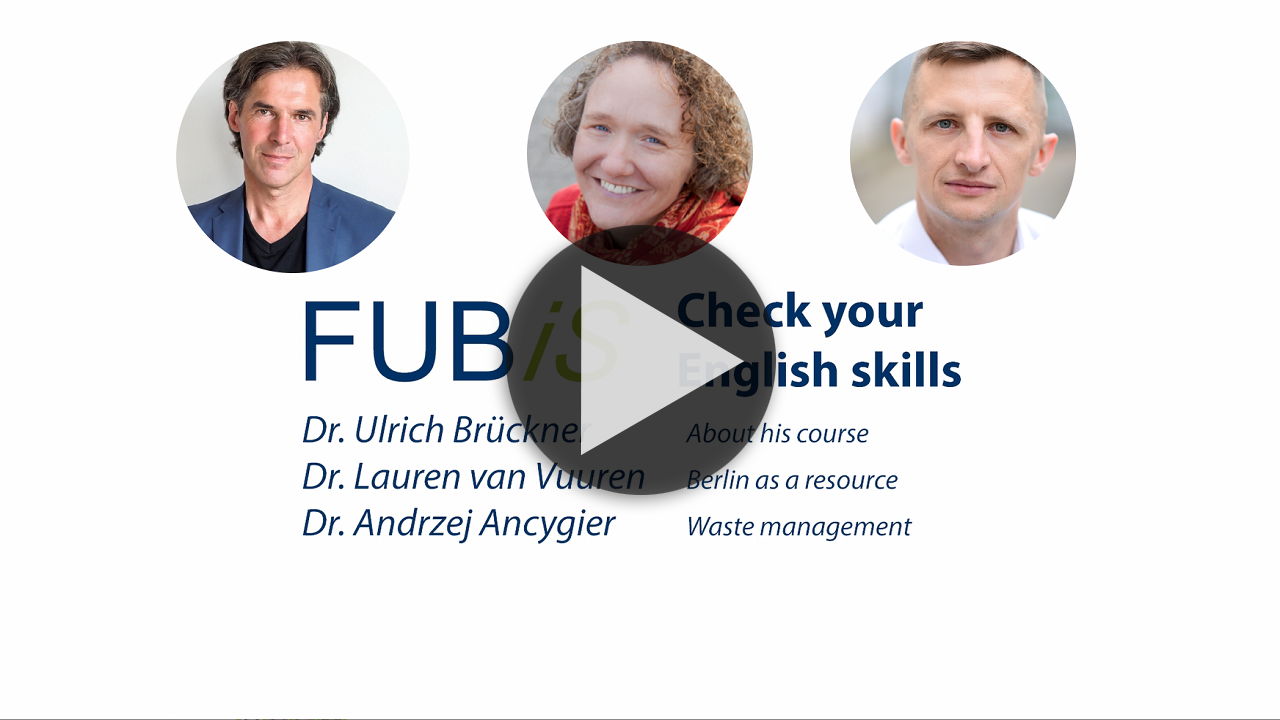FUBiS Term III 2022 Online
Online orientation: Thursday, July 21, 2022
Program end: Saturday, August 20, 2022
You can register here until June 25, 2022.
See here for an overview on fees and deadlines.
Program structure:
- An A-Track online language course can only be combined with a B-Track online subject course.
- An A-Track online subject course can only be combined with a B-Track online subject course.
- The number of participants in each course is limited to 18 (15 in language courses). In exceptional cases, more participants per class may be allowed.
Course schedule
A-Track Online Subject Courses
Language of instruction: English
Course type: Online subject course, A-Track
Contact hours: The coursework corresponds to an on-site course in term III amounting to 48 contact hours.
Course days: Monday & Thursday
Time: 8 am - 12:30 pm CEST
ECTS credits: 5
Course fee: € 1,250
Can be combined with all B-Track online courses
| 🌍 Critical global issues addressed in this course: Responsible Consumption and Production (SDG 12); Climate Action (SDG 13) |
Course Description
Our global challenges like climate change, social inequality and economic development mean that sustainability is more than a buzzword: The concept is being operationalized by companies, NGOs and policy makers. On a policy level, the UN Sustainable Development Goals (SDGs), the Paris climate agreement and the Green New Deal are setting the stage, on a business level, standards like Environmental Social Governance (ESG) reporting or ecovadis, supply chain integrity and voluntary certification as well as diversity crucial to long-term economic success.
How are companies innovating towards more sustainability today? What are the criteria, the success factors and the strategic approaches to tackle consumer, policy, employee and societal demand for more sustainability?
In this course, we will look at current sustainability frameworks, sustainable companies and sustainable innovation. The participants will get to know and to apply collaborative online tools to evaluate existing company sustainability approaches and to create their own business-related sustainability strategies.
The course will include at least two executives as guest speakers who will evaluate the created strategies and provide insights into their own approaches.
Download Syllabus (printable PDF incl. day-to-day schedule)Recommended Course Combinations (Selection)
B-Track Online Subject Courses
Language of instruction: English
Course type: Online subject course, B-Track
Contact hours: The coursework corresponds to an on-site course in term III amounting to 48 contact hours.
Course days: Tuesday & Friday
Time: 8 am - 12:30 pm CEST
ECTS credits: 5
Course fee: € 1,250
Can be combined with all A-Track online courses
| 🌍 Critical global issues addressed in this course: Gender Equality (SDG 5); Reduced Inequalities (SDG 10) |
Course Description
This course will introduce students to the broad and vibrating field of gender and diversity studies, crossing disciplinary boundaries and reflecting on contemporary global issues around gender and diversity. Key questions addressed in the course are: how does gender manifest itself and determine social (in)justice? Who is responsible for doing and undoing gender? How does gender intersect with other diversity grounds and lead to structural and systemic patterns of discrimination in our societies? What’s the role of states in bringing about (gender) equality?
During the first part of the course, students will gain familiarity with key working concepts, theories and perspectives – including intersectionality, masculinities studies and LGBTQI+ approaches – which will serve as essential analytical tools to be applied in the second part of the course. In the latter, the focus will be placed on concrete global challenges pertaining to gender and diversity, including the (under)representation of women and other groups in decision-making bodies and processes, the struggles of intersex and trans people suffering stigmatisation and discrimination in various global locations, gender-based violence in its multiple manifestations, and the often-unquestioned performative powers of language in sustaining and perpetuating gender and social hierarchies.
Having acquired the necessary background knowledge and analytical tools, students will engage in topical debates by unpacking complex and intersectional questions related to each of the above themes, suggesting potential avenues for change and identifying persisting challenges in achieving (gender) equality. An important feature of this course will lie in its interactive format, facilitated by the use of original and varied digital teaching tools (e.g. surveys, multi-media materials, break-out rooms, etc.). Students are expected to actively participate in small-group exercises, in-class debates and to give a short presentation throughout the course, with the aim of making learning a collective and shared experience and responsibility. Depending on availability, virtual visits (e.g., to local art exhibitions relevant to the course subject) and/or guest talks (e.g. with LGBTQI+ social society representatives) might represent further learning opportunities for students.
In the long-run, this course will motivate and empower students to think outside the box, to become aware of their positionality and challenge their own assumptions, to develop creativity and to adopt nuanced and multi-layered perspectives when approaching social justice questions.
Download Syllabus (printable PDF incl. day-to-day schedule)Recommended Course Combinations (Selection)
In addition to these courses, there will also be a comprehensive orientation with an introduction to the technical environment.
Check your English language skills
To find out if your English skills are sufficient to follow our subject courses, feel free to watch the following video. The language level of the video represents the level used in our courses. If you are not able to understand the video to a large extent, we don’t recommend a participation in an English-speaking subject course. In that case, how about a German Language course?


